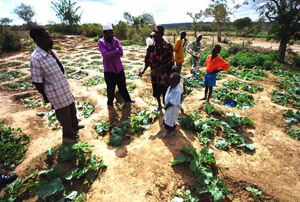 The recent disruption to air transport across Europe threw into stark relief the global nature of food supplies, as supermarkets began to run out of some food supplies, while others leapt in price as transportation costs soared.
The recent disruption to air transport across Europe threw into stark relief the global nature of food supplies, as supermarkets began to run out of some food supplies, while others leapt in price as transportation costs soared.
 While most people’s direct experience of the grounding of European flights was disruption to their Easter holidays and business travel, a hidden crisis deepened as food and, bizarrely, cut flower distribution virtually ground to a halt. In Switzerland one major supermarket chain ran out of roses, while Waitrose was anticipating a dearth of mangoes.
While most people’s direct experience of the grounding of European flights was disruption to their Easter holidays and business travel, a hidden crisis deepened as food and, bizarrely, cut flower distribution virtually ground to a halt. In Switzerland one major supermarket chain ran out of roses, while Waitrose was anticipating a dearth of mangoes.While that is an inconvenience to European shoppers, it could spell economic disaster for African growers. Christopher Snelling of the Freight Transport Association told Newsweek: “The longer that UK airspace is closed the greater the damage, not just to businesses here, but also for farmers in the developing countries. Their livelihoods are in serious jeopardy.”
Unlike those holidaymakers affected by the events, who could have some recourse via their insurance, the growers in Africa will have no avenues to claim compensation.
Some supermarkets resorted to alternative methods of importation. Tesco, for example, arranged for Kenyan fruit and flowers to be delivered to a hub in Spain and trucked to the UK. In any event the supermarket chain only imports 1% of its food by air.
The disruption also highlighted the issue of ‘food miles’: the environmental impact of transporting food across the globe to satisfy a consumer culture that demands access to everything all year round. It is a culture that is coming under fire from an increasing number of high-profile chefs and food writers, expressed in such TV programmes as BBC2’s What to Eat Now, presented by chef Valentine Warner.